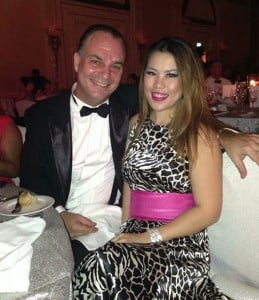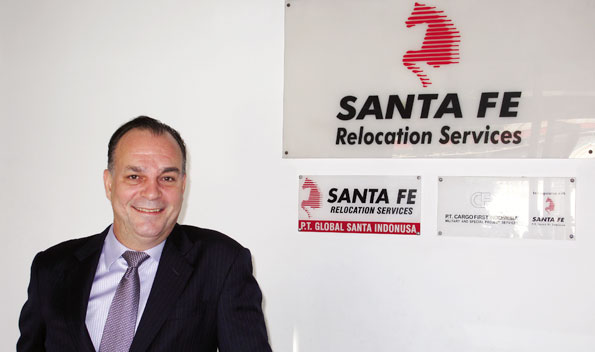Meet Jason Will, the eco-friendly businessman. Jason is keen on lending a helping hand to relieve social and environmental issues through numerous CSR projects with his company, Santa Fe Relocation Services.
When did you move to Indonesia, and where are you from?
I am originally from Brisbane, Australia and first moved to Jakarta in January 1999. After two years here, I relocated to Shanghai for three years, did a brief stint in Singapore and returned here in 2004 as President Director for Santa Fe Indonesia.
How did your journey with Santa Fe Relocation Services start? When did you start working for the company, and how did you end up in Jakarta?
I actually joined Santa Fe in Shanghai in 2001. I enjoyed the dynamic pace of Shanghai but after three years I asked to be moved closer to my two children who were living in Australia. So I was offered and accepted a position at our Singapore office, however it wasn’t long before the opportunity to take over Santa Fe Indonesia arose. Having lived here before made it an easy transition for me back to living and working here.
Apart from its literal meaning, what does CSR mean for you, personally?
Having lived and worked in Asia, you see firsthand the significant income disparity gap that exists in many places here. I believe that companies that earn money from operating in these locations also have a moral obligation to give back to the communities in which we operate. Every little bit helps.
What other CSR projects have you done with Santa Fe Relocation Services?
We have assisted organisations such as the Red Nose Foundation, Jakarta Animal Aid Network (JAAN), WatSan Action, World Vision and Habitats for Humanity. We also provide logistical support for organisations when there is a need for any relief projects. Most recently we funded a catfish cultivation project for the local community where our office and warehouse is located.
We thank you for Santa Fe’s support for Clean Up Jakarta Day. What urged you to support and be a part of Clean Up Jakarta Day?
We saw this as a great initiative. It is unfortunate that it seems that the culture of disposing of rubbish responsibly is not as prevalent as it should be here, but hopefully the publicity created by this event will help bring more awareness of this issue. Also much of the rubbish finds its way into rivers, which contributes to the clogged waterways and causes flooding issues.
Are there other organisations or causes that Santa Fe support? Why do you choose to support them?
Aside from the organisations I mentioned earlier, as we relocate a lot of expatriates when they leave Indonesia and many of these clients have furniture and other items they no longer need and do not want to take overseas with them, we therefore collect and distribute these items to various charities here.
Can you tell us a little bit about your ‘green’ office? What prompted Santa Fe to adopt this eco-friendly office environment, certified by the Indonesian Green Building Council?
One of the initiatives of the Santa Fe Group was to become a member of the UN Global Compact. The UN Global Compact is the world’s largest initiative on corporate responsibility with more than 6,700 members committed to promoting sustainable development using the 10 principles of social, environmental and economic responsibility as a framework. We report annually on our progress, promoting and supporting sustainable development in our work. I was fortunate to be given a major role in the design and construction of our new office and warehouse, which we finished building in July this year. So, naturally it was important to us to incorporate these environmental principles into the design and construction of our new facility. Therefore, we contacted the recently created Green Building Council of Indonesia (GBCI) to ask for their assistance and input in obtaining green certification for our office and warehouse. Consequently, our facility incorporates many ‘green’ features including rainwater harvesting, optimal use of natural light, bamboo flooring, waterless urinals, LED lighting, and handicapped facilities.
 How do you still find time to be the Ambassador for Internations? Can you tell our readers what Internations is and what you do for the organization?
How do you still find time to be the Ambassador for Internations? Can you tell our readers what Internations is and what you do for the organization?
InterNations.org is a worldwide organisation which supports more than 390 online communities around the world. Its primary aim is to help people who are living and working abroad to connect into their local community. I share the Ambassador role for Jakarta with Sony Jethani and together we organise regular gatherings for people to meet and build up their circle of friends. Unlike many other events in Jakarta, the InterNations gatherings are targeted purely for social purposes, not business. The Ambassador role is a volunteer position and to be honest, Sony probably spends the most time organising these events, so my job is as simple as turning up at the events (when I am in town) and making sure everyone is happy. I must say it really has gained a lot of popularity here and usually attracts 150 or more people to the gatherings. I have seen many strong friendships created from these gatherings, which has made living and working here much easier for many people.
If you’re not juggling work and projects, what do you enjoy doing in your spare time?
Much of my spare time is spent trying to keep up with my wife, Deisy who runs www.WhatsNewJakarta.com, which keeps us very socially active, however whenever I get the chance (unfortunately too infrequently) I try to enjoy a game of golf.
What would you recommend to people as the simplest way to be more ‘green’ in Jakarta?
A simple step would be to refuse plastic bags when buying things. My local DVD shop has finally gotten used to me refusing to take the DVDs in a plastic bag. I have seen estimates that over 4,000 tonnes of plastics bags are disposed in Indonesia every day and nearly all these bags are not biodegradable – which means they take over 1,000 years to break down. Every little bit helps, so we should all think twice before accepting a plastic bag.
What is your personal advice to company leaders in order to execute more CSR projects in the future?
It doesn’t take much effort to find many worthwhile causes to be involved with, but a start would be assigning someone in your company to identify potential CSR project opportunities and to oversee them. Also an easy way to implement ‘green’ initiative would be to ensure your company is only using recycled paper for your printers and photocopiers. We use a locally sourced paper called ‘Exceedo premium recycled’ which is 90% recycled. Also for each ream of this product that is used, your company will contribute to saving 20 litres of water consumption, reducing 0.1 lb of emission of air pollutants, saving 3.1 kWh electricity consumption, saving 1.1 litres of oil consumption and saving 40,500 Btu of heat energy. Also their bleaching process is chlorine free. So, find out what type of paper your company is using.
Jason may be contacted via his email [email protected]
www.santaferelo.com/jakarta




